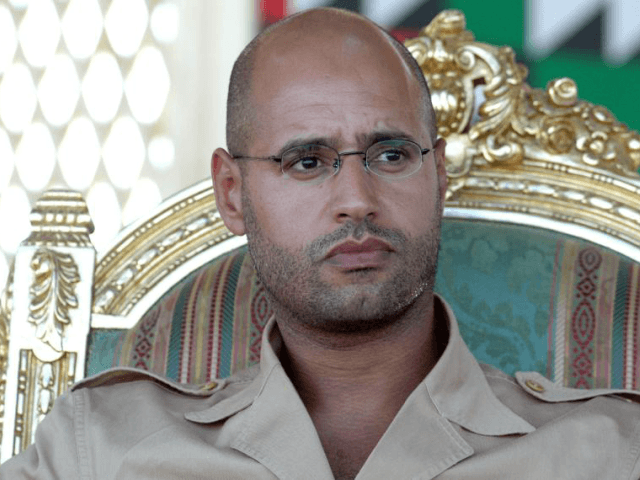Supporters and former members of the regime of Muammar Qaddafi in Libya may be planning to organize for a chance to run the country again after son Saif al-Islam Qaddafi announced, through an intermediary, that he would run for president in 2018, Bloomberg reports.
Citing individuals close to the Qaddafi’s, the outlet reported last week that the ongoing chaos since the elder Qaddafi’s demise in 2011 may present an opportunity to unite voters in the upcoming 2018 presidential election.
Saif al-Islam is arguably the most prominent of Qaddafi’s sons, having taken the streets of Tripoli and ensured the public that his father remained in control of the country shortly before he was dragged out of his palace and killed on video. Saif al-Islam was arrested shortly thereafter by the Abu Bakr al-Sadiq Brigade, which chose to free in him in 2017. Following his liberation, the International Criminal Court (ICC) demanded the younger Qaddafi’s immediate arrest on war crimes charges; a Libyan tribunal had sentenced him to death independently while under confinement.
In mid-December, Qaddafi family spokesman Basem Al-Hashimi Al-Soul told the outlet Egypt Today that Qaddafi would appear on the ballot in 2018. “Saif enjoys the support of major tribes in Libya and he will offer Libyans measures to stabilize the country in accordance with the Libyan geography and in coordination with all Libyan factions.” al-Soul claimed.
Qaddafi loyalists rapidly began the work of proclaiming Saif al-Islam a frontrunner in this year’s elections. One former official, Ahmed Gadhaf al-Dam—Muammar Qaddafi’s cousin—proclaimed Qaddafi the “favorite” in any upcoming elections. Reports had indicated that al-Dam himself was organizing a presidential bid in November, though he appears to be backing his nephew. “We represent the majority of Libyans. And we want to set things right and correct the past,” al-Dam said at the time.
“People are frustrated. Even those who were against the old regime will side with him as he’s not coming back representing the old regime. He’s coming with his plan for Libya’s future,” another former Qaddafi official, Abdel Majeed al-Mansouri, told Bloomberg. “I see a big chance for him because all the big tribes are supporting him.”
Bloomberg notes, “most Libya analysts disagree.” The report does cite one analyst, Issandr El Amrani of the International Crisis Group, warning that Qaddafi’s move means “Libya’s getting more complicated.”
Libya has been ruled by factions of warlord-run militias and conflicting United Nations (U.N.)-sponsored governments since the elder Qaddafi’s demise. The current U.N.-backed government, under Chairman of the Presidential Council of Libya Fayez al-Sarraj, is planning to host a presidential election this year. It has received support in this endeavor from the nation’s most powerful and organized warlord, General Khalifa Haftar of the Libyan National Army, but only if the elections occur with U.N. supervision.
Rumors swirled last year that Haftar, who has the backing of both Russia and Egypt, would also run for president in that election. Haftar, a former Qaddafi general who rebelled before the dictator fell, has established himself as a strong anti-jihadist voice in the east of the country. Russia also supports Sarraj, however it is unclear whether Sarraj would also run in these elections.
Sarraj has warned that elections are not guaranteed to occur due to opposition for unnamed political powers within Libya. Given the sectarian nature of how Libya is divided politically today, it is possible that any opposing tribal militia could prevent government officials from entering their territory to organize ballots and count votes.
The High National Elections Commission in Libya (HNEC) has reportedly registered nearly two million voters for the upcoming ballot as of December 2017.

COMMENTS
Please let us know if you're having issues with commenting.